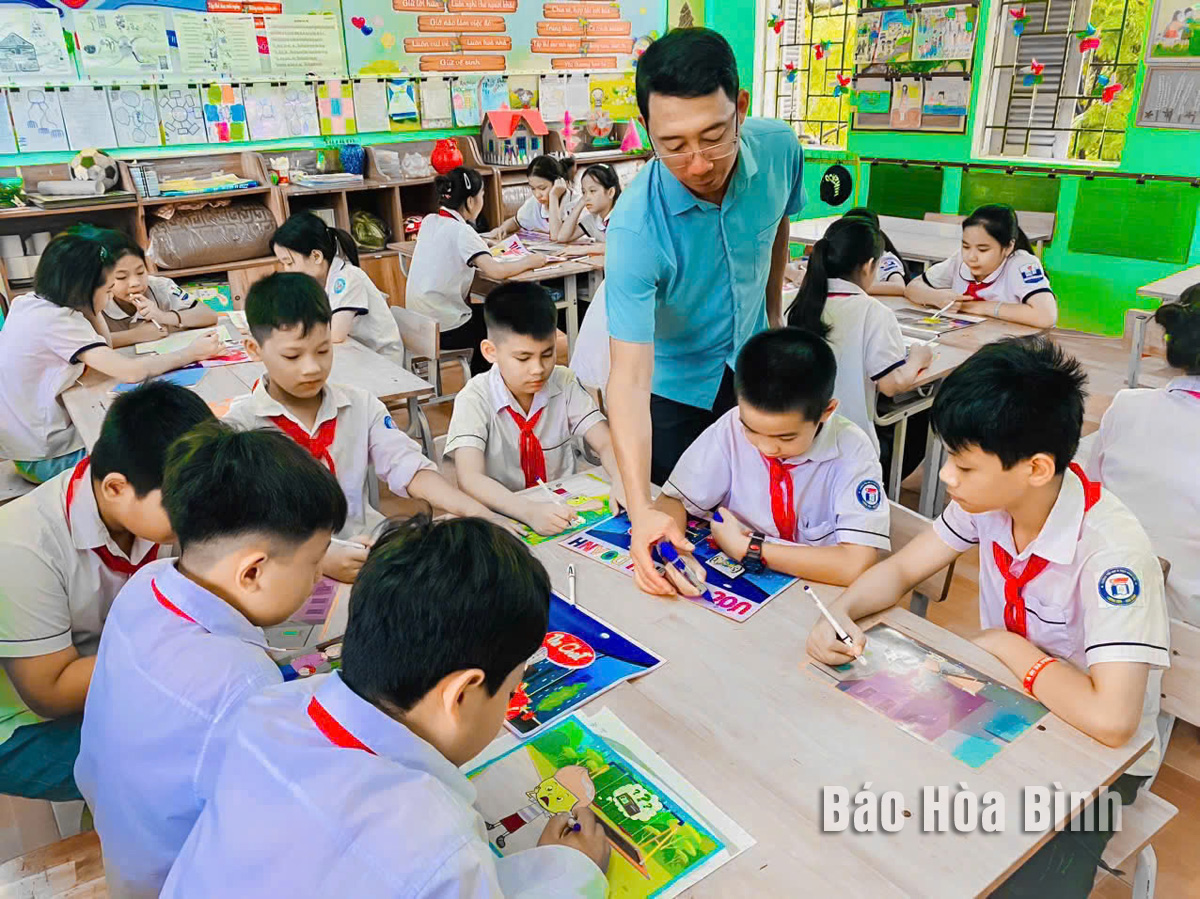
In October, Nguyen Van Thuy, a primary school teacher at Hung Son Primary and Secondary School in Luong Son town, Luong Son district, was one of three Vietnamese representatives to receive the Inspiring Teacher Award at the Asia-Pacific Cha-Ching Financial Accreditation (CCFA) Teacher Conference for the 2023-2024 academic year.

Teacher Nguyen
Van Thuy guides students in a game as part of the Cha-Ching Financial Literacy
Project.
Twenty-eight years of experience in teaching, 10 years as an
exemplary head of the school’s Ho Chi Minh young pioneer organisation awarded a
certificate of merit by the Ho Chi Minh Communist Youth Union Central
Committee, and many years earning the title of Excellent Teacher at the school
and district levels are Thuy’s impressive achievements. In the 2023-2024
academic year, Hung Son Primary and Secondary School implemented the Cha-Ching
financial literacy project for the first time for the fourth and fifth graders.
Thuy was one of the seven teachers at the school who received training to teach
in accordance with this new model.
With his enthusiasm and creativity in every lesson, Thuy has
been highly praised by the school administration and the advisory board of the
Cha-Ching Financial Literary for Kids Programme. Among the three Vietnamese
awardees, he had the honour of representing Vietnam to deliver a bilingual
speech in both Vietnamese and English at the online conference summing up the
programme held on October 18.
The teacher expressed his honour to be selected as one of
the 16 teachers from the Asia-Pacific region to receive this award, adding that
this is not only a personal achievement but also the result of the collective
efforts of both the teachers and students of Hung Son Secondary and Primary
School.
The programme, organised by Prudential Vietnam Life
Insurance Company in collaboration with Junior Achievement (JA) Vietnam, equips
children aged 7 to 12 with financial management knowledge and skills, helping
them cultivate smart financial habits. It focuses on four key skills: earning
money, saving, spending, and donating. After five years of operation in
Vietnam, Cha-Ching is being taught at 314 primary schools in Hanoi, and Hoa
Binh, Hung Yen, Quang Ninh, Quang Binh, Dong Nai, and Dong Thap provinces.
More than just an information technology teacher, Bui Van Nien is an inspiring figure who has nurtured the scientific curiosity and creative spirit of students in Vietnam’s ethnic minority communities.
Da Bac is the most disadvantaged mountainous district in Hoa Binh province, with ethnic minorities accounting for about 90% of its population. Over the past years, the district has mobilised resources to implement ethnic policies to improve the quality of life of local people.
In recent years, Hoa Binh province has consistently prioritised the protection, care, and education of children, particularly those from ethnic minorities and disadvantaged backgrounds, by creating a safe, healthy, and nurturing environment for their all-round development.
The Steering Committee for Tobacco Harm Prevention and Control of Hoa Binh province, in coordination with the Tobacco Harm Prevention and Control Fund, held a ceremony on May 28 in response to the World No Tobacco Day (May 31) and the National No Tobacco Week (from May 25 to 31). The event was chaired by Nguyen Van Toan, Standing Vice Chairman of the provincial People’s Committee and head of the Steering Committee.
Since 2021, the Center for Industrial Promotion and Industrial Development Consulting (CIIDC) under the Department of Industry and Trade has been implementing a school lighting model as part of the plan for using energy efficiently and economically in Hoa Binh Province in the pẻiod of 2021 - 2025. This model not only aims to improve the learning conditions and enhance the education quality, but it also promotes the message of energy saving, energy security, environmental protection and contributes to the goals of socio-economic development.
In the 2024 - 2025 school year, the entire Hoa Binh provincial education sector includes 520 educational institutions and schools. Among them are 13 ethnic boarding schools with 153 classes and 4,487 students. Four of these schools have met national standards, reaching 30.7 percent.



